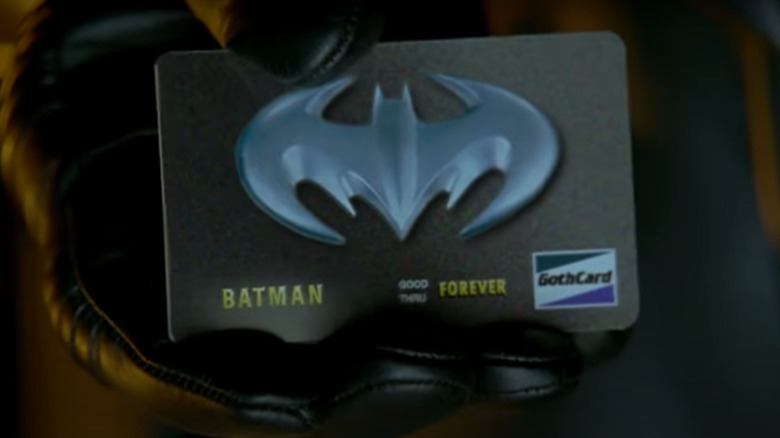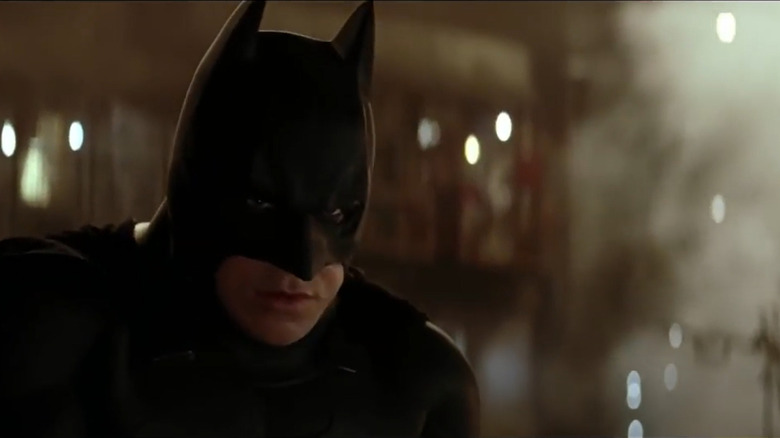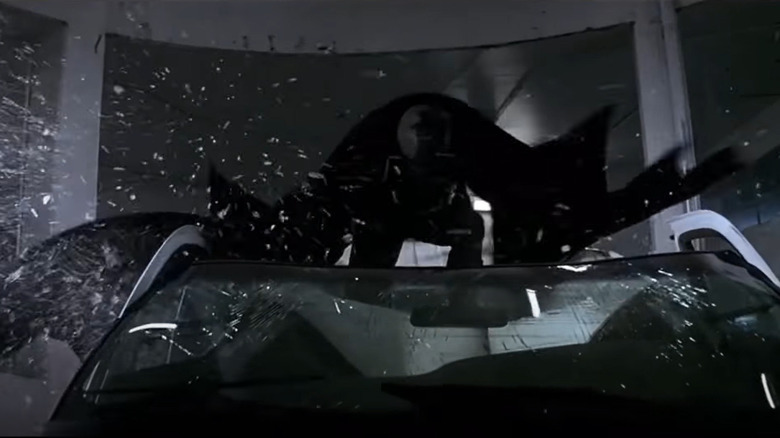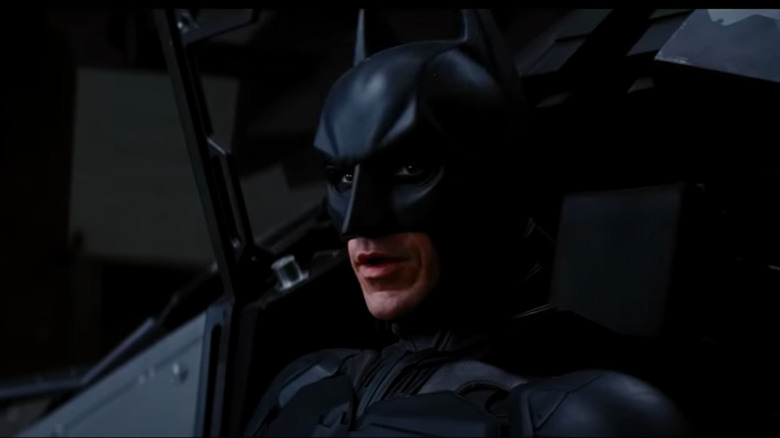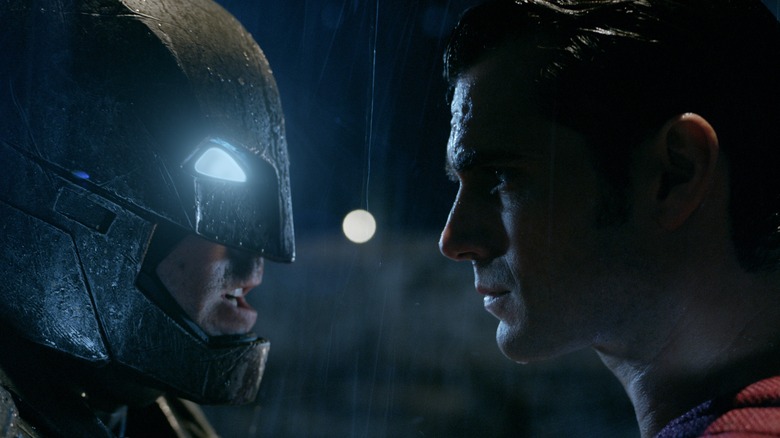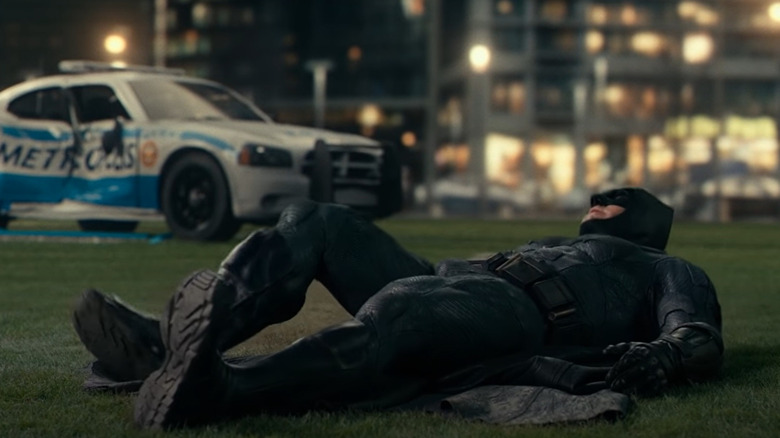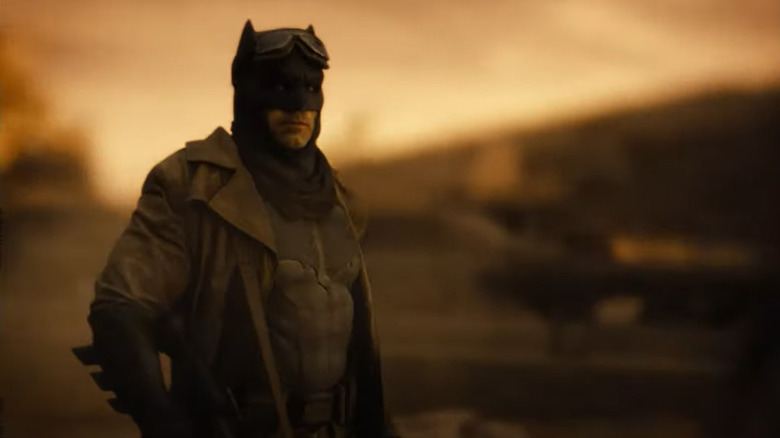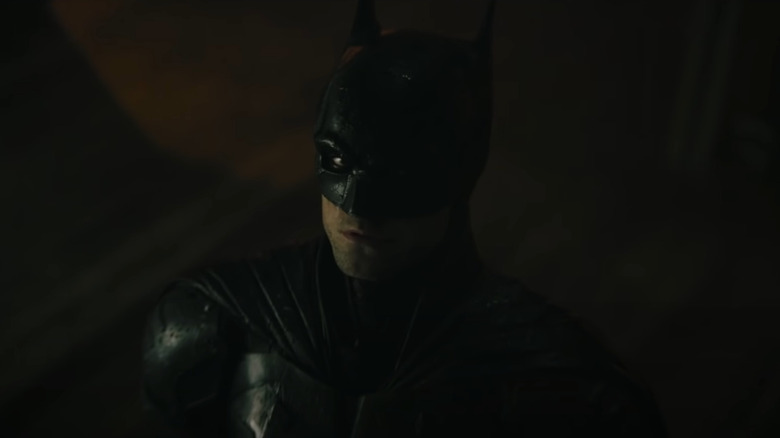The Most Memorable Batman Quotes From Every Live-Action Batman Movie
The funny thing about Batman is most of the time, he's not funny.
In the broader superhero culture where Spider-Man, Iron Man, and the Flash constantly quip and crack wise, the Dark Knight generally keeps his face straight and stoic. Luckily, Batman's rogues' gallery and roster of sidekicks both contain multiple self-styled comedians. Batman can keep right on being his brooding, dour, serious self, and Gotham City will hardly suffer from a shortage of one-liners.
What this means for Batman movies is most of the time, the villains get all the coolest, most memorable lines of dialogue. Heath Ledger's Joker — not Christian Bale's Bruce Wayne — is clearly the standout talker in 2008's monumental triumph, "The Dark Knight." The same can be said for Jack Nicholson's Joker in 1989's "Batman," as well as Michelle Pfeiffer's Catwoman and Danny DeVito's Penguin in 1992's "Batman Returns." Even Cillian Murphy's Scarecrow — hardly a global threat compared to other Bat-baddies — delivers the scorching potential catchphrase, "Would you like to see my mask?" That's much cooler than anything Bruce Wayne gets to say in 2005's "Batman Begins."
If we concede that his villains, by and large, tend to devote more attention to their wordplay, does that mean Batman never gets any memorable dialogue in his own movies? It does not. We spent some time contemplating the matter and determined that when it comes to the live-action movies, these are Batman's best lines. Warning — there are spoilers below.
Some days, you just can't get rid of a bomb
Whenever someone mentions 1966's "Batman" — essentially a feature-length episode of the quintessentially campy 1960s TV series created by William Dozier – of course we think of the Shark Repellent Bat Spray that the Caped Crusader uses to fend off an aquatic assault early in the film. The Shark Repellent Bat Spray is iconic. However, the scene lacks any of the wisdom and philosophical insight that's characteristic of Adam West's Batman.
The best line comes later when, after foiling a kidnapping attempt by the United Underworld, Batman physically rushes a massive explosive device away from a crowded area. Whenever he thinks he's close to a location that might be isolated enough for a safe detonation, he runs into innocent bystanders, including a couple on a date, a pair of nuns, a mother with a baby carriage, and a family of ducks.
A frustrated Batman exclaims, to no one in particular, "Some days you just can't get rid of a bomb." Who among us can't relate to this sentiment? Some days, simple tasks prove to be wildly complicated for reasons we can only attribute to blasted coincidence.
The '60s TV version of Batman might be more wholesome than most contemporary live-action versions, but this scene proves he's cut from the same cloth. After all, Batman finds himself in a similar situation and behaves in a similar manner towards the conclusion of 2012's "The Dark Knight Rises."
I'm Batman
Joker has a number of punchy lines that stand out in the trailers for 1989's "Batman" — "Wait'll they get a load of me." "Where does he get those wonderful toys?" As for the eponymous masked hero, when a panicking mugger begging for his life cries, "Who are you?" Batman replies, simply and directly, "I'm Batman."
And with that, he's made his point. He doesn't need to say more.
Adam West's version of Batman does a lot of thinking out loud — solving mysteries and unraveling conundrums in real time. Michael Keaton's Batman is a lot less chatty, and this is entirely by design. Keaton himself doesn't think Batman should say much. Instead, he opts to let the iconography and Tim Burton's signature atmosphere set the tone while Batman brushes his foes aside with the sheer force of his presence.
Keaton's Batman isn't a fast talker, and perhaps due to the cumbersome nature of his Batsuit, he isn't an acrobatic fighter either. All he needs is an epic Danny Elfman soundtrack, Burton's macabre vision of Gotham City, and a determined look on the part of his face that starts under his nose because that's the only part of his head we can see under the cowl.
He says he's Batman, and we know he ain't foolin'.
Mistletoe can be deadly if you eat it
Setting aside our questions about why anyone would ever eat mistletoe, Batman and Catwoman find themselves under the festive and romantic plant twice in "Batman Returns."
The first time, in the guise of their nocturnal vigilante identities, Batman makes the observation that mistletoe can be deadly when eaten. Catwoman responds, "A kiss can be deadlier if you mean it." Later, in their civilian personas at Max Shreck's masquerade ball, the pair of animal-themed lovers find themselves under yet another decorative mistletoe. "Mistletoe can be deadly if you eat it," says Selina, remembering her earlier conversation with Batman, prompting Bruce to repeat Catwoman's observation about sincere kisses. This marks Bruce and Selina's moment of mutual recognition and a turning point for the rest of the movie.
The mistletoe lines directly reference the Batman-Catwoman romance and the visually poignant late December setting of the story. Furthermore, while Batman exchanges words with the Penguin and Max Shreck at various points in the film, does anybody who hasn't watched "Batman Returns" within the past four or five hours remember those scenes? If we're putting together a list of cinematic Batman moments that stick out in our minds indefinitely, Catwoman's in all the enduring segments of "Returns."
Chicks love the car
The pair of "Batman" films directed by Joel Schumacher in the '90s have an entirely deserved reputation as silly and garish. Let's say they're plenty of fun to watch for a certain type of Batman fan, even if they're not creative successes by any measure.
Batman — played by Val Kilmer in 1995's "Batman Forever" — develops a sense of humor he lacks in the Tim Burton films, and he shows off his new appreciation for zingers and self-deprecation while flirting with Dr. Chase Meridian, played by Nicole Kidman. Dr. Chase shines the Bat-Signal to summon Batman under the shaky pretext of offering information to help his ongoing battle with Tommy Lee Jones's Two-Face. Then she confesses that she basically used the Bat-Signal to make a booty call.
"It's the car, right? Chicks love the car," Batman responds, tossing off some of the flippant, low-key misogyny that permeates "Forever," and its sequel, 1997's "Batman & Robin."
Perhaps the opening segment of "Batman Forever" — in which Batman says, "I'll get drive-through," specifically so the scene can be reused in a McDonald's Commercial – is a more ominous omen of the Schumacher films' most shameless impulses. Nevertheless, Batman's assessment of the Batmobile's aphrodisiacal capabilities is more memorable. All kinds of things are wrong with "Batman Forever," but to their credit, Kilmer and Kidman muster enough chemistry to avoid getting completely overshadowed by Jim Carrey's overwhelmingly bonkers Riddler performance.
Never leave the cave without it
Though it has its defenders, "Batman & Robin" is generally considered the nadir of "Batman" movies. Maybe it gets more hate than it deserves; plenty of other comic book movies are every bit as stupid. "Batman & Robin" might even make a worthy zonked-out late-night watch in the spirit as 2019's "Cats" or Tommy Wiseau's 2003 anti-masterpiece, "The Room." "Batman & Robin" isn't making the world worse. It didn't even meaningfully harm the Batman brand in the long term, but it's still a 125-minute toy commercial.
As for memorable lines, during an auction for a date with Uma Thurman's tragically wasted Poison Ivy, George Clooney's Batman gets in a bidding war with Chris O'Donnell's Robin and busts out a black GothCard. With this gesture, Batman certainly impresses Gotham's wealthiest socialites with his presumably infinite line of credit.
"Never leave the cave without it," brags the Bat.
But wait a moment. How can GothCard issue a line of credit to Batman — a pseudo-identity created by Bruce Wayne? Does the bank know that Bruce Wayne and Batman are the same person? Also, what kind of credit card doesn't have an expiration date? The Tim Burton Batman movies aren't the most grounded stories ever told, but they never toss the metaphorical Ice Princess of plausibility off the roof willy-nilly for a quick visual gag. The Bat-card is unnecessary and doesn't make sense, making it an effective symbol for the totality of "Batman & Robin." But everyone certainly does remember it.
It's not who I am underneath but what I do that defines me
As far as Batman's cinematic love interests go, Rachel Dawes gets knocked down the rankings by an effective but distracting recasting and her tragic demise in "The Dark Knight." She can't compete with Pfeiffer's Catwoman — then again, who among us can?
Nevertheless, Rachel Dawes — portrayed by Katie Holmes in 2005's "Batman Begins" — plays a major role in shaping Christian Bale's Bruce Wayne on his journey to becoming Gotham's watchman. She reminds the angry but pampered 20-something Bruce that the systemic factors behind his parents' murder don't change easily. When Bruce reappears in Gotham after a long absence, Rachel runs into him while he pretends to be a boozy, womanizing dullard and gives him some verbal side-eye.
"It's not who you are underneath; it's what you do that defines you," she tells feckless rapscallion Bruce Wayne.
Later, during an encounter with Batman, Rachel asks who he is, and he replies, "It's not who I am underneath but what I do that defines me," which Rachel correctly understands to mean Batman is her childhood pal and sometimes crush, Bruce Wayne. The line serves the plot, and it resonates on a thematic level. "Batman Begins" is ultimately about Bruce overcoming intrinsic flaws and becoming the best version of himself. For Batman to begin, young Bruce Wayne, the self-involved rich jerk, must end.
I'm not wearing hockey pads
"Why so serious?" "Do you know how I got these scars?" "Whatever doesn't kill you simply makes you ... stranger." And the list goes on. Heath Ledger's Joker gets all the best lines in "The Dark Knight." Batman can beat him up really badly and send him to prison, but he's a lot less likely to say anything that'll wind up on a T-shirt at Hot Topic.
Even if Batman's the second (jeez, maybe even the third or fourth?) most charismatic character in his best movie, he still gets at least one zinger in before riding the Batcycle off into the sunrise. Early in the film, a vigilante militia of Batman impersonators break up a drug deal between the Scarecrow and the Chechen. Before the supercriminal and the gangster can kill all the cosplayers, the real Batman swoops in and saves the day, smashing up the Scarecrow's car something brutal during the burlap-sacked baddie's escape attempt.
As he's tying up all the individuals involved for the police to deal with, one of the cosplayers asks, "What gives you the right? What's the difference between you and me?" Batman responds, "I'm not wearing hockey pads."
Joker probably could've come up with something snappier, but still, we've got to give Batman credit for a sick burn.
A hero can be anyone
Batman movies aren't known for tear-jerking sentimental moments, but while we might have complicated feelings about 2012's "The Dark Knight Rises," we can't deny getting a little choked up at the end.
As history repeats itself, Batman has to get rid of a bomb that's about to atomize Gotham City. He hooks the explosive device up to the Batplane and prepares to fly it far enough out to spare everyone except himself. Gary Oldman's Commissioner Gordon asks, "Shouldn't the people know the hero who saved them?" Batman says, "A hero can be anyone. Even a man doing something as simple and reassuring as putting a coat around a young boy's shoulders to let him know the world hadn't ended." Then we flash back to a moment from many years earlier, where a young Gordon comforts the recently orphaned Bruce Wayne in just such a manner, as depicted in "Batman Begins."
The "Dark Knight Trilogy" gets a lot of press for being well, dark, but at its core, it's a story with a moral about the value of being kind and looking out for your fellow travelers in this world. The Nolan/Bale iteration of Batman — some argue, the best of the lot — is essentially Elmo for grownups, and we mean that as the highest praise.
Tell me ... do you bleed?
For the best Dark Knight line in "Batman v Superman," we have to go with his classic challenge to the Man of Steel: "Tell me ... do you bleed?" Of course, there's another moment from the 2016 film that comes in at a very close second place for his most memorable line. However, the infamous "why did you say that name?" moment doesn't mean anything without its context, and it's actually Superman who says, "Save Martha." (Plus, this is supposed to be a reverent list of Batman quotes.)
The version of Batman that Ben Affleck plays in Zack Snyder's series of DC films is defined a ruthless efficiency that other interpretations don't tend to put front and center. Therefore, by posing the question as to whether Kryptonians can be injured by cuts just like humans, Batfleck immediately declares that he's a little different from the Caped Crusader we're used to, and he sounds totally badass in the trailers.
It happens to be the case that Superman does not, in fact, bleed. Of course, he does die in a fight against Doomsday at the end of the movie, which forces Batman to reconsider his position on Superman and superhumans in general. Also, it turns out Superman's adoptive mom and Batman's real mom have the same first name. What are the odds?
Something is definitely bleeding...
The behind-the-scenes tragedies, shenanigans, and malfunctions throughout the "Justice League" production have been thoroughly covered elsewhere. Speaking strictly in terms of the two versions of the movie — 2017's theatrical cut directed by Joss Whedon and 2021's straight-to HBO Max iteration overseen by original director Zack Snyder — Whedon's is a lot shorter and has a lot more jokes.
If we look at Joss Whedon's "Justice League" as a reaction to the dour, depressing elements of "Batman v Superman," then the inverted take on the trailer line from "BvS" is the defining moment of the movie. During his post-resurrection fight with the rest of the Justice League, Superman asks Batman, "Do you bleed?" Then he drops him like a sack of potatoes. After Superman sees Lois Lane and instantly loses interest in beating up costumed upstarts, Batman responds in the affirmative, "Something is definitely bleeding..."
Joss Whedon has taken a lot of flak in recent years, much of it entirely deserved. But now and again, he can still write a heck of a funny superhero quip.
Make no mistake...
During the flashforward to the alternate future (or is it just a dream?) in "Zack Snyder's Justice League," we learn Batman and the Joker — the latter played by Jared Leto — have formed a very shaky alliance against an apparently corrupted and twisted Superman. Here, Joker taunts Batman with reminders of all his tragically killed friends and family. Finally losing his cool after decades of Joker's obsessive abuse, Batman crosses a line we've never seen him cross before.
He drops the F-bomb.
"Make no mistake," says Batman, "I will f*****g kill you."
While it's not the most important line to the overall story of "Zack Snyder's Justice League" — in fact, whether or not it even happens within the movie's canonical timeline at all is questionable — it's probably the most emblematic. Batman's much too popular for Warner Bros. to let him swear most of the time. But the studio caved for Snyder, finally letting Batman get as edgy as cinematically possible.
I'm vengeance
In a vacuum, the phrase "I'm vengeance" coming from the Dark Knight sounds hammy as heck. Hammy though it may be, that line conveys serious thematic gravitas within the larger context of 2022's "The Batman."
Bruce Wayne — Robert Pattinson, this time around — begins the film with a borderline psychotic obsession with his crusade against Gotham's superstitious and cowardly. This version of Batman has more in common with Rorschach of "Watchmen" infamy than, for instance, the Bright Knight Adam West portrays in the '60s.
Over the course of the story, events transpire that force Bruce to fold some empathy and humility into his perspective. Simultaneously, he observes the limits and issues with a revenge-based worldview, best illustrated by the Riddler — played by Paul Dano — who's genuinely shocked to discover Batman doesn't think of him as a likeminded ally. Worse yet, one of the Riddler's goons unknowingly echoes Batman's catchphrase back in his face after the Caped Crusader foils an attempted mass murder. "I'm vengeance," says a maniac pointing a sniper rifle at innocent bystanders.
The story ends with Batman realizing that vengeance alone won't cut it, and he pledges to become a symbol of hope ... as well as brutal retribution against evil.





